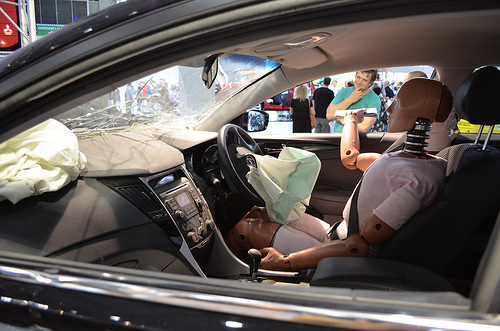On the brink of the largest recall in U.S. history
Members of Congress are calling faulty air bags from Japanese manufacturer Takata “a public safety threat,” foreshadowing what could become the country’s largest recall in history and prompting skepticism about automakers’ ability to manage the recall.

Takata airbags have triggered the biggest recall in U.S. history. From smjbk.
It could be massive, affecting more than 30 million cars and trucks — top-selling models from Honda, Toyota, Chrysler, GM, and six other companies among them — across the country. The National Highway Traffic Safety Administration (NHTSA) has so far limited the recall to areas of high humidity, such as Florida, Hawaii, and the U.S. Virgin Islands, due to the belief that the defective air bags are especially dangerous in humid conditions.
The origins of the defect are unclear, but faulty propellants are suspected. When inflated, air bags that have the troubled propellants may cause shrapnel to fire into passengers. On Christmas Eve 2009, 33-year-old Gurjit Rathore of Virginia was hit in the neck with pieces of an air bag that exploded while she was driving her Honda Accord. Her three children watched their mother bleed to death, according to a lawsuit filed by the family.
To date, the air bags have been blamed for four deaths and more than 100 injuries. Although the incident rate is low, senators Richard Blumenthal (D-Conn.) and Edward J. Markey (D-Mass.) are “increasingly troubled and alarmed” by the NHTSA’s response to the issue, they wrote in a letter to the agency last week.
Critical of the limited geographic recall, the lawmakers wrote that there was “no factual basis for distinguishing between states or regions of the country regarding the potential severe danger of this defect.”
“Replacement parts are ‘essential to personal safety’ for all drivers whether they live in New England or Florida,” they continued.
But the NHTSA defended its actions, arguing that a widespread recall could divert the limited supply of replacement air bags from areas where higher rates of risk have been demonstrated.
At issue is Takata and carmakers’ ability to provide replacement air bags. Honda has said that it doesn’t have enough parts to immediately fix the 5 million-plus Civics, Accords, and other models carrying the faulty air bags, while Toyota has told dealerships to disable those in affected models. Notes warning riders against sitting in the passenger seat should be temporarily affixed to the glove boxes, the company said.
With air bags in short supply, Karl Brauer, a senior analyst at Kelley Blue Book, told the press that it may take “years for this to be addressed.” In the meantime, “you could have tens of millions of dangerous vehicles on the road,” he said.
Aware of that possibility, policymakers in Washington have requested briefings with the NHTSA. Fred Upton (R-Mich.), who chairs the House Energy and Commerce Committee that will review the recall, has promised to take a hard look at its timeline and scope.
“When it comes to vehicle safety, there can be no margin for error,” he told the media.
Related Posts
Category: Legislation, Transportation

















